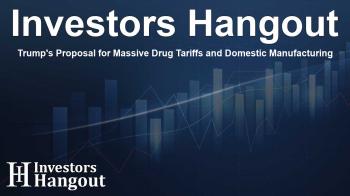Trump's Proposal for Massive Drug Tariffs and Domestic Manufacturing

Trump's 250% Tariff Threat on Pharmaceuticals
In a bold move reflecting his administration's stance on domestic manufacturing, President Trump has proposed tariffs on imported pharmaceuticals that could increase to a staggering 250%. This figure represents the highest tariff proposal concerning pharma that has been articulated so far.
The Goals Behind the Tariff Proposals
Initially, Trump aims to implement a smaller tariff on pharmaceuticals, gradually escalating it. His objective is to nudge these pharmaceutical companies towards relocating their manufacturing facilities back to the United States, thereby generating jobs and stimulating the national economy.
Manufacturing in the U.S.
The President made his vigorous sentiment clear, stating, "We want pharmaceuticals made in our country." This emphasis on domestic production indicates a strategic priority of his administration—securing self-sufficiency in critical sectors such as pharmaceuticals.
Uncertainty Surrounding Tariff Implementation
Despite the fervent rhetoric, the actual implementation of these tariffs remains uncertain. Trump's earlier warnings of imposing 200% tariffs on the pharmaceutical sector highlight the potential volatility of his trade policy decisions.
The Broader Context of Pharmaceutical Pricing
This latest tariff proposal aligns with Trump’s broader campaign against high drug prices. Recently, he issued an ultimatum to 17 major pharmaceutical companies, urging them to lower prices or face severe consequences—a clear warning that the administration is serious about addressing the affordability crisis in healthcare.
Impact of Tariffs on the Industry
The pharmaceutical sector is acutely aware of the potential disruptions these tariffs could create. Concerns have been raised that such tariffs might increase drug costs, deter future investments in the U.S. market, and jeopardize the drug supply chain, ultimately compromising patient access to essential medicines.
Ongoing Investigations by the Trump Administration
In response to rising concerns regarding foreign imports, the Trump administration initiated a Section 232 investigation into the pharmaceutical industry. This investigation aims to assess whether foreign imports pose a threat to national security, reflecting a growing trend in U.S. trade policy to prioritize local over global production.
Challenges from Trade Agreements
Furthermore, the pharmaceutical industry is navigating the implications of recent trade agreements, particularly a deal between the U.S. and the European Union. A 15% tariff on branded drugs coming from Europe is expected to complicate the pricing landscape, as increasing costs may be passed down to consumers, limiting access to necessary medications.
Conclusion and Future Considerations
While the proposed tariffs aim to bolster American manufacturing and reduce drug prices, they also open the door to broader economic consequences. The balancing act between ensuring affordable healthcare and maintaining a competitive pharmaceutical industry remains a pivotal challenge for the administration.
Frequently Asked Questions
Why is President Trump proposing these tariffs on pharmaceuticals?
Trump aims to encourage domestic manufacturing and lower drug prices by imposing tariffs on imported pharmaceuticals.
How high could the proposed tariffs get?
The proposed tariffs could rise to as much as 250%, signaling a significant increase from current levels.
What are the potential impacts of higher tariffs on drug prices?
Higher tariffs may lead to increased drug costs and reduced investment in U.S. pharmaceutical manufacturing, potentially limiting access to medicines.
What actions has the Trump administration taken regarding pharmaceutical imports?
A Section 232 investigation has been launched to evaluate the security implications of pharmaceutical imports.
How are pharmaceutical companies responding to these proposals?
Companies like Eli Lilly and Johnson & Johnson are seeking to build goodwill with investments in the U.S. to counteract the potential negative impacts of tariffs.
About The Author
Contact Riley Hayes privately here. Or send an email with ATTN: Riley Hayes as the subject to contact@investorshangout.com.
About Investors Hangout
Investors Hangout is a leading online stock forum for financial discussion and learning, offering a wide range of free tools and resources. It draws in traders of all levels, who exchange market knowledge, investigate trading tactics, and keep an eye on industry developments in real time. Featuring financial articles, stock message boards, quotes, charts, company profiles, and live news updates. Through cooperative learning and a wealth of informational resources, it helps users from novices creating their first portfolios to experts honing their techniques. Join Investors Hangout today: https://investorshangout.com/
The content of this article is based on factual, publicly available information and does not represent legal, financial, or investment advice. Investors Hangout does not offer financial advice, and the author is not a licensed financial advisor. Consult a qualified advisor before making any financial or investment decisions based on this article. This article should not be considered advice to purchase, sell, or hold any securities or other investments. If any of the material provided here is inaccurate, please contact us for corrections.

